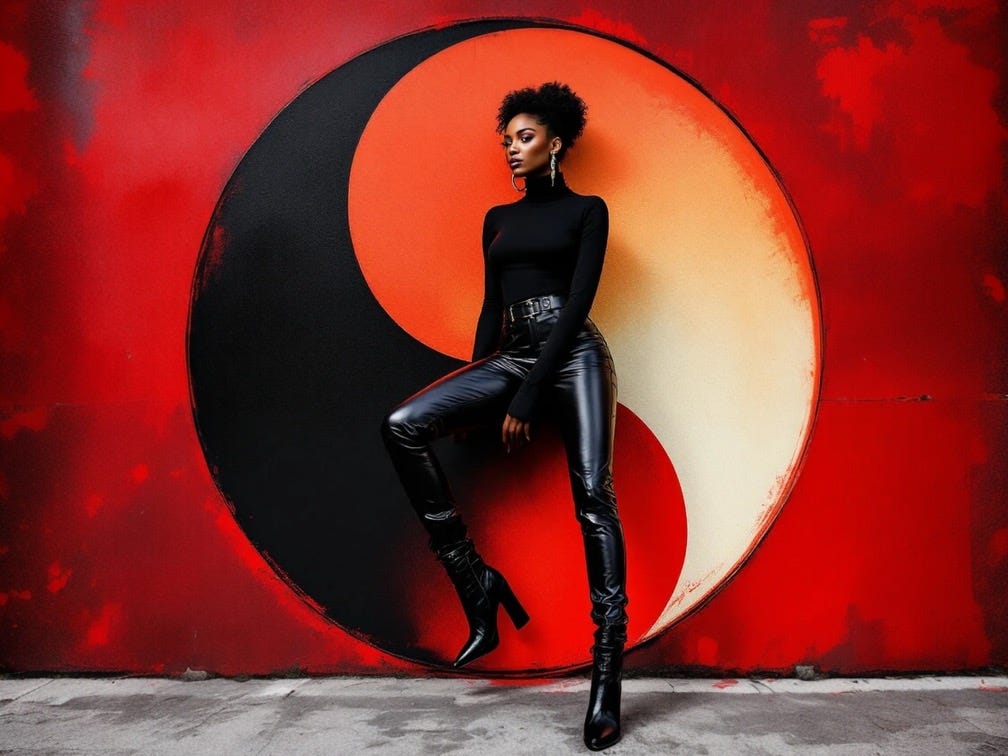There’s something quietly brutal about realizing how long you’ve been performing intimacy instead of living it. About how often you’ve held someone close—physically, emotionally, spiritually—while secretly orbiting your own body like a satellite, watching yourself play a role you were trained to play.
Tantra and Taoism, when stripped of their marketable mystique, are not about performing anything. They’re about BEING……
…Deeply. Nakedly. And sometimes, devastatingly so. 💥
For years, I understood Tantra as a concept. I could speak of Shiva and Shakti, polarity, presence, breath, eye contact, surrender. I could wax poetic about sacred union and the merging of energies.
Same with Taoism—I’d quote Lao Tzu on softness overcoming hardness, on the virtue of yielding, of moving like water.
But what I’m learning now, practically rather than intellectually, is that you can’t chase that union. You can only fall into it. Or better yet, become it. And you can’t become it with someone, or something, that is merely a placeholder for the flame you’re afraid to follow.
That’s the lesson burning through me right now. In fact, there’s a question I’ve started carrying like a silent mantra, namely, “does this light me up, or is it just a placeholder? It applies to everything: the conversation I’m in, the work I’m doing, the lips I’m kissing, the path I’m walking.
Am I lit from within, or am I just filling space because I don’t yet trust the vastness of the void?
Embodied Wisdom From The Masters
Epicurus might whisper that pleasure is the absence of pain, but he didn’t mean endless stimulation. He meant alignment. Peace. That full-belly satisfaction when body, mind, and spirit all say yes in the same breath.
Zhuangzi would laugh at my need for clarity. He’d offer a parable about a butterfly or a useless tree, then sip tea while I wrestled with the ambiguity. But even he would nod at the importance of inner resonance—the knowing without knowing that arises when you stop trying to will life into shape and simply feel the shape life is making of you.
The Stoics, paradoxically, would agree. Not in the sense of chasing sparks, but in honoring the spark when it shows itself. They’d say: Don’t cling, don’t crave, but also don’t deny the logos flowing through your marrow. Marcus Aurelius might’ve said, If something feels right in your bones, it probably is—so long as it’s in harmony with nature. What’s more natural than fire?
And Shiva? The cosmic dancer of stillness and destruction? He’d remind me that sometimes the flame has to burn away everything that is false before it reveals the core truth.
Tantra isn’t about getting off—it’s about getting real. And realness starts with silence, breath, still presence. When you stop faking the flame, you either discover it’s already alive—or you’re forced to admit it never was.
I used to think I needed someone to activate that fire in me. A sacred other. A twin flame. A divine mirror. But the Tao doesn’t work that way. Nor does Tantra. The truth is, if I’m not already lit up—deep, slow, radiant—then nothing outside me can ignite what isn’t already smoldering.
This isn’t about intensity. It’s about authenticity. Some things burn bright and fast. Others warm you for a lifetime. And many? Many are just placeholders, flickering like motel neon on the edge of your longing.
So I’ve started leaving space. Letting discomfort in. Asking the awkward, soul-piercing questions. Am I touching or performing touch? Am I present or just pretending? Am I aligned or afraid?
Sometimes, the answers sting. But they also set me free.
The Tao teaches that the Way isn’t something to grasp. It’s something to return to. Over and over, in every breath, every caress, every quiet no.
Tantra reminds me that love isn’t a peak—it’s a pulse. And if I’m not vibrating with the pulse of presence, then no amount of technique or theory or longing can make it real.
So I’m done faking it. Done filling space with people or pursuits that don’t light me up. This is the season of saying no to placeholders and yes to presence. The path of Tantra meets the Tao where I drop the pretense and let the fire be honest.
And in that still, burning center, I begin to find home again—not in someone else, but in the deep, fierce, surrendered truth of my own body, my own breath, my own being.
If the Daily Chocolate Taoist nomadic wisdom lights up your day, fuels your mind, or gives you a fresh perspective, I’d love your support as a paid member!
Or, if you’re feeling generous, drop a little (or a lot) of dirty chai latte love my way—every bit helps keep this Taoist journey flowing.
I’m committed to delivering high-quality, thought-provoking features straight to your inbox—no paywalls, no fluff, just raw, unfiltered wisdom on what it means to be human in today’s paradoxical, mysterious, and uncertain world.
Your support fuels my full-time mission, and I appreciate every single contribution. Let’s keep this energy going!
Diamond Michael Scott
aka The Chocolate Taoist






"Does this light me up, or is it just a placeholder?" I love these questions. I've been asking the first question for a long time, but never Part B. I really appreciate that additional reflection. Many years ago, I attended a lecture with Gary Zukav. To this day, I remember walking away with this question he suggested we ask ourselves, "What's my underlying agenda?" It seems to complement what you're pointing to in this post. And again, the confluence of Tantra and the Tao feels so valuable for these times we're living in.
Eastern spiritualism is often sold as a kind of magic entrance to more reality, whatever that means. It's the same kind if deeper experience that sells certain Christianity. It also is what sells drugs. The hope for more intense feeling about whatever captures the attention at the moment. It's what drove Peggy Lee as she sang, "Is That All There Is." I very much understand that, because I have felt it nearly all my life, sometimes quite intently. But, like with drugs, it always disappoints. The youth culture that has driven almost everyone insane for nearly a century now. In truth it has always driven insanity.
There's really no difference between the dull sense of disappointment that nearly everyone (maybe everyone) experiences, from a mild let down to the intense disappointment Peggy Lee expressed. It may be what killed Alexander the Great. We know his complaint that there was no other kingdoms for him to conquer. I think it's to some extent what's behind the depression that many soldiers experience after they return home after fighting in wars.
I want that feeling of satisfaction from Tantrism. But I deep down know that it's bound to be an empty promise. The reason Mick Jager's sone, "Can't get no satisfaction," was so popular was that it's so common to people.
When I'm driving in my car
And a man talks on the radio
He's telling me more and more
About some useless information
Supposed to fire my imagination